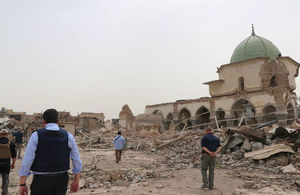Press release: Study points to new ways to reduce conflict in fragile states

The Elite Bargains and Political Deals research indicates that greater focus on the politics of conflicts, and those who control power and resources on the ground, is crucial to reducing violence.
The Minister for the Middle East and for International Development Alistair Burt said:
“This research report sets out to answer two of the most difficult questions in foreign policy today: How can we help reduce levels of violent conflict? And how do we deal with the often unsavoury groups and individuals that sustain them?
Today, thousands are suffering in seemingly intractable conflicts across the world. We must do what we can to reduce their plight and minimise the dangers that conflict and instability pose to our own national security.
We need to keep reviewing our approach in light of experience, and that is what this report seeks to do.”
The report is the result of 18 months of research by cross-government and independent academics and was launched on 14 June at Chatham House.
The study seeks to provide a more robust evidence base for the UK’s approach to stabilisation and to help policymakers provide more effective interventions in conflict contexts. Lessons from global conflicts, past and present, are identified in the report.
The Stabilisation Unit is an agile, cross-government unit that provides advice and expertise to prevent and de-escalate conflict and meet national security challenges in high-risk environments.
Follow Minister Burt on Twitter @AlistairBurtUK
For journalists, email SUComms@dfid.gov.uk
Last updated 19 December 2018 + show all updates
- Link to Elite Bargains project page and press contact details updated.
- First published.